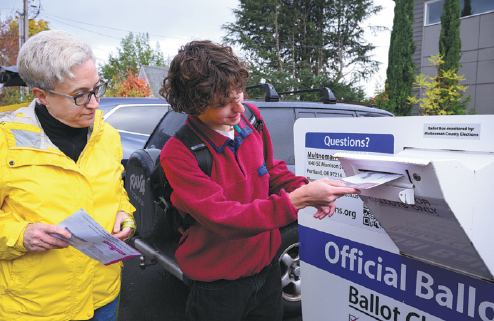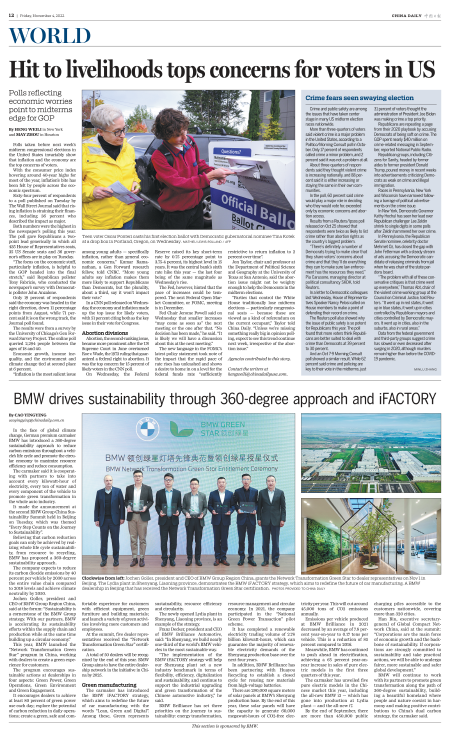
Teen voter Oscar Ponteri casts his first election ballot with Democratic gubernatorial nominee Tina Kotek at a drop box in Portland, Oregon, on Wednesday.
Polls taken before next week's midterm congressional elections in the United States invariably show that inflation and the economy are the top concerns of voters.
With the consumer price index hovering around 40-year highs for most of the year, inflation's bite has been felt by people across the economic spectrum.
Sixty-four percent of respondents to a poll published on Tuesday by The Wall Street Journal said that rising inflation is straining their finances, including 36 percent who described the impact as major.
Both numbers were the highest in the newspaper's polling this year. The poll gave Republicans a two-point lead generically in which all 435 House of Representatives seats, 35 US Senate seats and 36 governor's offices are in play on Tuesday.
"The focus on the economic stuff, particularly inflation, is helpful to the GOP headed into the final stretch," said Republican pollster Tony Fabrizio, who conducted the newspaper's survey with Democratic pollster John Anzalone.
Only 19 percent of respondents said the economy was headed in the right direction, down 11 percentage points from August, while 71 percent said it is on the wrong track, the Journal poll found.
The results were from a survey by the University of Chicago's Gen Forward Survey Project. The online poll queried 2,294 people between the ages of 18 and 40.
Economic growth, income inequality, and the environment and climate change tied at second place at 6 percent.
"Inflation is the most salient issue among young adults — specifically inflation, rather than general economic concerns," Kumar Ramanathan, a Gen Forward research fellow, told CNBC. "More young adults say inflation makes them more likely to support Republicans than Democrats, but the plurality, about a third, say it won't impact their vote."
In a CNN poll released on Wednesday, the economy and inflation made up the top issue for likely voters, with 51 percent citing both as the key issue in their vote for Congress.
Abortion divisions
Abortion, the second-ranking issue, became more prominent after the US Supreme Court in June overturned Roe v. Wade, the 1973 ruling that guaranteed a federal right to abortion. It was the top concern for 15 percent of likely voters in the CNN poll.
On Wednesday, the Federal Reserve raised its key short-term rate by 0.75 percentage point to 3.75-4 percent, its highest level in 15 years. It was the central bank's sixth rate hike this year — the last four being of the same magnitude as Wednesday's rise.
The Fed, however, hinted that the pace of increases could be tempered. The next Federal Open Market Committee, or FOMC, meeting is in December.
Fed Chair Jerome Powell said on Wednesday that smaller increases "may come as soon as" the next meeting or the one after that. "No decision has been made," he said. "It is likely we will have a discussion about this at the next meeting."
The new language in the FOMC's latest policy statement took note of the impact that the rapid pace of rate rises has unleashed and shows a desire to home in on a level for the federal funds rate "sufficiently restrictive to return inflation to 2 percent over time".
Jon Taylor, chair and professor at the Department of Political Science and Geography at the University of Texas at San Antonio, said the abortion issue might not be weighty enough to help the Democrats in the midterm elections.
"Parties that control the White House traditionally lose midterm elections — particularly congressional seats — because these are viewed as a kind of referendum on the current occupant," Taylor told China Daily. "Unless we're missing something really big in opinion polling, expect to see this trend continue next week, irrespective of the abortion issue."
Agencies contributed to this story.
Contact the writers at hengweili@chinadailyusa.com.

